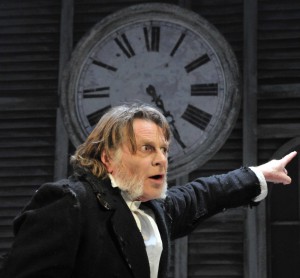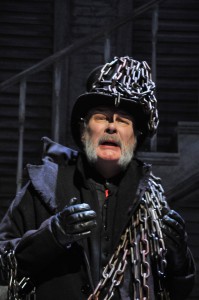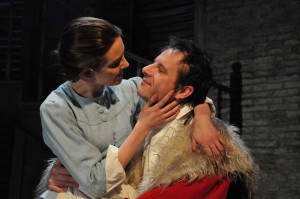Review: A Christmas Carol at the Lowry Centre
Article published: Sunday, December 19th 2010
The Library Theatre Company bring to life the classic Christmas tale of the redemption of an avaricious miser in an entertaining and musical performance at the Lowry Centre. Given the current political climate, some of themes – greed, stinginess and compassion – are now more relevant than ever.
The tale is a well-known one. This is the story of Ebeneezer Scrooge, the quintessential misanthrope who despises all source of human warmth – especially Christmas. On Christmas Eve he is visited by three spirits – the ghosts of Christmas past, present and future – who make him repent his wicked ways and open his soul to his fellow creatures.
Whereas we are used to depictions of a frail and elderly Scrooge, David Beames projects in the lead role an embittered and cantankerous old man who still has some vitality to him. With a convincing pathos he shows how the ice of Scrooge’s heart melts as the spirits take him to the sad and joyful scenes of his own past which moulded him into the gnarled creature we now see.
Beames brings out the latent comedy of the text as Scrooge visits his own former years of jollity and the current ones of his nephew. However the one disappointment of his performance is that he fails to deliver Scrooge’s refrain of ‘bah, humbug!’ with much panache or gusto. While this stops the play from falling into panto, it leaves it without the force of one of its funniest lines.
It is following the intermission that the show really takes off, as the players warm to the stage. Driving the narrative is the marvellous Kath Burlinson as The Ghost of Christmas Present. A mixture of enticing pixie and ethereal witch, she leads Scrooge through the painful reality in which many live without offering any easy answers.
The entrance of the Ghost of Christmas Future, the final apparition, provides us with a visual spectacle in the form of a ten foot moving skeleton that marches with a frightening and shivering gait. The most sinister of all the apparitions, its wordless vision of the bleak future provides a glimpse to Scrooge of the possible fate on which he is on the cusp of – and which ultimately leads him to repent.
At times there is an over-reliance on background music in order to set the emotional tone; this can make the performance somewhat sentimental, even annoyingly trite, while detracting from the acting as the main source of energy. However this is completely overshadowed by the brilliant choral singing of traditional Christmas hymns which are peppered throughout the play. Through the simplistic and plaintive melodies, backed up by dazzling harmonies, the players convey a timeless sense of the solemnity of the season. The inventive musical aspect of the play, coupled with dance sequences, brilliantly harnesses the stage to give a new interpretation of an old classic.
Perhaps unwittingly the play revives many Victorian moral ideals which bear resemblance to the undertones of the political discourse of the coalition government – certainly with regards to social welfare. Thus we have Bob Cratchet, the embodiment of the ‘deserving poor’: a hard-working family man who, despite his crushing poverty and low wages, never bemoans his lot in life and shows unfailing deference to his social superiors. Similarly, Scrooge’s eventual transformation carries with it the message that individual philanthropy can be the cure of society’s ills, rather than system change.
Dickens’ note of protest is heard clearly through the words which come back to haunt Scrooge: ‘are there no prisons [for the poor]? Are there no workhouses? … If they would rather die then they had better do it and decrease the surplus population’; words which echo the disguised sentiment of those in power today who seek to end incapacity benefits, EMA and housing allowance for the least well-off in society. While his protest at terrible living conditions and plea to a collective social conscience are laudable we should be wary of its application today.
The irony of this moral tale is that it mimics the basic mechanism of Christian ethics, in that virtues such as generosity and sympathy are not seen as inherent goods in themselves, but rather forms of behaviour which should be followed on pain of eternal suffering. So does its moral remain relevant today? We only have to wait to see whether Messrs Cameron and Clegg awake on Christmas Day this year to a sudden change of heart…
Michael Pooler
Comments
No comments found
The comments are closed.






